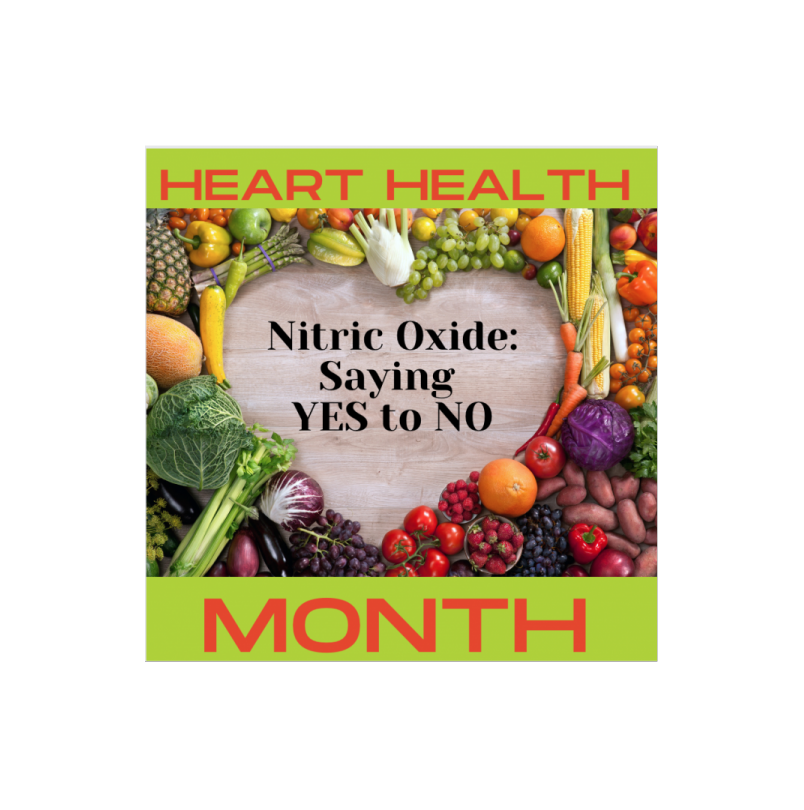NITRIC OXIDE: LET'S SAY Y-E-S TO N-O (UPDATED FOR 2023)

We all know by now that February is Heart Health Month – so, let’s say YES to NO and give our hearts a lot of love!
Nitric Oxide (NO), science says it’s a magic molecule. This is truly your body’s own wonder drug and making sure you create as much as you can, quite possibly will:
· Lower your blood pressure
· Improve your circulation
· Delay the onset/progression of atherosclerosis
· Reduce the likelihood (and can prevent) a heart attack or stroke
NO is produced in the lining of the blood vessels and it regulates blood flow and oxygen delivery. Its job is to widen, or expand, the vessels to keep blood flowing smoothly. So, when your heart is pumping fast because you’re exercising, NO is at work to make sure your blood vessels are expanding to allow the rush of blood to run through easily.
As we age, our ability to produce NO decreases, and by the time we are 50, we have lost half of our ability to produce the molecule- good thing we have a back up plan! By eating plants rich in nitrates, we can increase our NO. That said, there is a pathway between taking in nitrates in food and converting it to useful NO and that takes place in both our oral and gastrointestinal bacteria and the acid in our stomach.
However, there are two common products that many people use that inhibit NO production because they kill the bacteria and stomach acid needed for conversion:
· Mouthwash
· Antacids
Mouthwash
Therapeutic (antibacterial / antiseptic / antimicrobial) mouthwashes destroy bacteria in your mouth that can contribute to the growth of cavities and other dental diseases. Unfortunately, these mouthwashes kill all types of bacteria, including the beneficial ones that help produce nitric oxide, and specifically the bacteria in the mouth that convert nitrate to nitric oxide. In fact, we humans cannot produce nitric oxide from nitrate without these bacteria.
Research has shown us that mouthwash kills the oral bacteria needed to produce nitric oxide for up to 12 hours. This leads to a decrease in nitric oxide production and, in some instances, an increase in blood pressure, a precursor to heart disease and stroke. (Article.)
To maintain adequate nitric oxide production, please use mouthwash sparingly.
Antacids
Another necessary part of the conversion from nitrite to nitric acid includes stomach acid, and if you are one of the 200+ million people taking an antacid, you are eliminating the blood pressure lowering effects. These drugs also further inhibit the vascular production of NO. This shuts down NO production through both pathways and if on a proton pump inhibitor for 3-5 years, the chance of having a heart attack or stroke is increased by 35%. Here’s how you can begin to manage acid reflux on a plant-based diet.
Now you know what to steer clear of, what are two things you can do to boost NO production for a strong vascular system? You guessed it! Diet and exercise!
The food
More than 80% of plant-foods are rich in nitrates and easily converted to nitric oxide. A simple google search will provide you with a comprehensive list, but for starters, my favorite nitrate packed foods include dark leafy greens, nuts, seeds, blueberries and beets. Also – if you are someone who always buys organic, you might want to think about sprinkling in in-organic produce from time to time.
“Organic produce may have more vitamin C, iron, magnesium, and phosphorus, but it tends to have fewer nitrates since synthetic nitrogen fertilizers are banned by law from organic agriculture. Eating 15% more organic veggies to get the same nitrate intake is easy, but, for beets, the spread can be larger. On the other hand, organic beets may have more of certain phytonutrients, like the red pigment for which beets are known, which may explain why the organic beet extracts had significantly higher anti-cancer effects in vitro compared to conventional beets.” -NutritionFacts
If you’re a little wary about beets, here are two easy and delicious recipes that you’ll love:
“ …Eight out of the top ten are green leafies, with the winner by a large margin being arugula! 18 times more nitrate than kale!
Ten years ago, a pair of twin Harvard studies found the more fruits and vegetables you eat, the lower your risk of heart disease. The most powerful protector—green leafy vegetables. And now, perhaps, we know why.”
Move it!
Endothelium is the thin layer of cells that line the blood vessels. These cells produce nitric oxide, allowing for expansion and lasting health. Insufficient nitric oxide production results in endothelium dysfunction, which can contribute to atherosclerosis, high blood pressure and other risk factors for heart disease.
Exercise keeps your endothelial cells and blood vessels healthy by increasing your body’s natural ability to produce nitric oxide.
Studies have shown that regular physical activity increases endothelial vasodilation in people who have high blood pressure and heart disease, as well as in healthy individuals. The benefits of exercise on endothelial health and nitric oxide production can be seen in as little as 10 weeks when exercising for 30 minutes at least three times a week. You can do that!
For optimal results, combine aerobic training, such as walking or jogging, with anaerobic training, such as resistance training. The types of exercise you choose should be things you enjoy and can do long term.
To learn more about the role Nitric Oxide plays in supporting good heart health, here are a few great resources:
Rip Esselstyn talks with Dr. Nathan Bryan
The Nitric Oxide (NO) Solution, Dr. Nathan Bryan*
NO More Heart Disease, Dr. Louis J.Ignarro*
*Indicates an Amazon link to our plant-based store. Prices have not been increased for commissions made. Thank you for your support!
______________________________________________
Do you know about our STREAMING PLUS membership?
Our membership is built like a streaming service - you get a full library of plant-based cooking classes to watch whenever you want. PLUS, you gain access to upcoming interactive virtual cooking classes and a monthly accountability group call.
As a member you get:
- Complete library of all past virtual classes - stream them whenever you’d like!
- Free access to upcoming virtual classes
- Library of easy and quick recipes: 100 and growing
- Access to private Facebook group
- Monthly accountability check-in and support group Zoom call with Caryn
- Quarterly “Ask the Doc” call with Dr. Jim Loomis, our Medical Director
- A community of support
To learn more, please visit us here.

